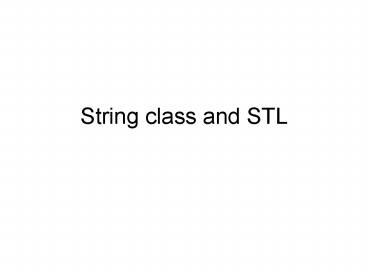String class and STL - PowerPoint PPT Presentation
Title:
String class and STL
Description:
begin() // return an iterator that refer to the first element in a container, ... If the container elements are user-defined objects, then we should have an ... – PowerPoint PPT presentation
Number of Views:37
Avg rating:3.0/5.0
Title: String class and STL
1
String class and STL
2
- string class has the following constructors
- string (const char s) //initialize a string
object with the string pointed by s - string(size_type n,char c)
- // create a string object with n element every
of them char c - string() creates a default string object of 0
size
3
- string(const char s, size_type n)
- // initialize n byte of string with s
- templateltclass Itergt
- string (Iter begin, Iter end) //initialize a
string - // object to the values in the range begin, end)
, begin and end act like pointer.
4
- includeltiostream.hgt
- includeltstringgt
- int main()
- string one(this is test one)
- coutltltoneltltendl
- string two (20,)
- string three(one)
- coutltltthreeltltendl
- oneadd something
- twochange two
- three0P
- string four
- fourtwothree
- coutltltfour
- char s the take some part of string
- string five(s,20)
- string six(s6,s10)
- coutltltsixltltendl
5
- char input100
- cingtgtinput
- cin.getline(input,100)
- cin.get(input,100)
- string s
- cingtgts
- getline(cin,s) //read a line, discard \n
- cin.getline(input,100,) // read up to ,
discard - getline(cin,stuff,) //read up to , discard
6
- int main()
- ifstream infile
- infile.open(test.txt)
- if( infile.is_open()false)
- coutltltnot open
- exit(1)
- string item
- int count
- getline(infile,item, )
- while(infile )
- count
- coutltltcountltltltltitemltltendl
- getline(infile,item,)
- infile.close()
- return 0
7
- string s1(this is)
- string s2(is this)
- char s320that is
- if( s1 lt s2)
- if(s1s3)
- if(s3 !s2)
8
Standard Template Library
- STL provides a collection of templates such as
containers, iterators and algorithms. - A container is a unit like an array that can hold
several values.
9
vector template class
- // vector is a container
- include vector
- vector ltintgt v(5) // a vector of 5 int
- int n
- cingtgtn
- vector ltdouble gt scores(n)
- for(int i0 iltni)
- coutltltscoresi
10
- vectorltstringgt title(5)
- We can get the size of the vector by size()
- // number of elements
- swap() exchange the contents of two containers
- begin() // return an iterator that refer to the
first element in a container, - end() returns an iterator that refers to the last
element.
11
- Iterator is a generalization of a pointer, in
fact it can be a pointer. It can be an object for
which operations such as , -- has been defined.
- Each container class defines a iterator.
- vector ltdoublegt iterator pd
- // pd an iterator
- vector ltdoublegt scores
- pd scores.begin()
- pd22.3
- pd
12
- push_back()
- Add an element to the of a vector, and increase
vector size. - vectorltdoublegt scores
- double temp
- while( cin gtgt temp temp gt0)
- scores.push_back(temp)
13
- erase() // remove a given range of a vector.
- scores.erase(scores.begin(), scores.begin()2)
- insert() takes three arguments
- //first give the position of which new elements
are to be inserted. - vectorltintgt old
- vectorltintgt new
14
- old.insert(old.begin(),new.begin()1,new.end())
- More methods
- for_each(), random_shuffle(), sort()
- For_each() // can be used with any container
class. - It takes three argumnet, the first two are
iterators defining the range and the third one in
a pointer to a function.
15
- vector ltTgt V iterator pr
- for( pr V.begin() pr !V.end() pr)
- show(pr)
- for_each( V.begin(), V.end(), show)
- //the function must NOT alter the element of the
vector
16
- The randon_shuffle() function takes two iterators
that specify a range and rearrange the element in
that range in the random order. - Random_shuffle(V.begin(), V.end())
- vectorltintgt s
- sort(s.begin(), s.end()) // it sorts in
non-decreasing order. - If the container elements are user-defined
objects, then we should have an opeatorlt()
function.
17
- struct R
- string title
- int rate
- bool operatorlt ( const R r1, const R r2)
- if( r1.title lt r2.title )
- return
- else if( r1.title r2.title r1.rate lt
r2.rate) - return true
- else
- return false
- vector lt Rgt book
- sort(book.begin(), book.end())

